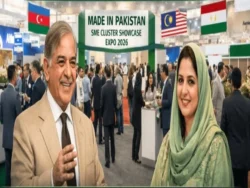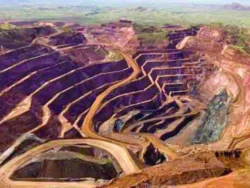Relationship gold: Expanding ties between Pakistan and Saudi Arabia

October 06, 2023
Authorities in Pakistan are contemplating the possibility of selling their Reko Diq shares to Saudi Arabia. Through its participation in the Pakistan Mineral Summit a couple of months ago, the Kingdom had indicated its interest in Pakistan’s mineral sector. The recently created Special Investment Facilitation Council (SIFC) had identified four sectors for foreign direct investment in Pakistan and the mineral sector was one of them. The others were energy, agriculture and information technology. The idea behind establishing this body was to create a regulatory and administrative mechanism to facilitate investment in the minimum possible timeframe and to eliminate red tape.
Although the matter of selling Reko Diq shares is theoretical at the moment, it may be instructive to study its various aspects. So far, Pakistan’s ties with GCC countries were based on defence and security co-operation, age old ideological and cultural bonds and similarity of views on political and strategic issues. We are clearly out of the Cold War era and the bipolar world that was the source of sharp divisions. In the current scenario, geo-economics is assuming more traction as ideological divisions have receded. International groupings are more malleable now and space for international trade and investments has increased in this global village like scenario.
Reko Diq, according to current estimates, has 12.3 million tons of copper and 20.9 million ounces of gold. Barrick Gold, a Canadian company, has 50% shares and the rest are with the governments of Pakistan and Balochistan, in equal measure. This field alone can be an economic bonanza for Pakistan and can catapult historically neglected Balochistan into a most prosperous province. Apart from its ornamental use and age old position of storage of value, this glittering yellow metal has a number of industrial uses as well. Copper has multiple uses and the foremost is its suitability for electric cable. No wonder Reko Diq deposits have attracted international attention.
An apex committee, headed by the Prime Minister, has been established for periodic review of matters related to the SIFC. Its recent meeting was attended by the top military brass. So civil and military leaderships are on one page in promoting domestic and foreign investments. That is the surest way to give clear signals to investors that the government is sanguine in its commitments.
It may be fruitful for both governments to have a round of talks first at the expert level before the private sector is involved.
Javed Hafeez
The shares that Pakistan’s government wants to sell are currently held by three public sector entities. After a long experience with public sector companies, there is now a consensus in Pakistan that running businesses and industries is best done by the private sector. A number of government owned enterprises are running in losses and Pakistan Steel is a prime example.
Privatization promotes competition and expunges structural inefficiencies. It generates growth and provides incentives for hard work and innovative ideas. A privatized entity may initially look callous as it roots out nepotism. But in the long run, it is highly beneficial as it promotes merit. A number of banks in Pakistan are being successfully run by foreign owners. Banks owned by Pakistani owners are also doing well because of healthy competition. In the world of economic and commercial competition, only the fittest survive. Reko Diq’s mineral potential has been known for decades but it was with the arrival of Barrick Gold that a roadmap for extraction and refinement could be announced.
Details of sectors identified by SIFC have been shared with China, Saudi Arabia, UAE and Qatar. In fact, China is already extracting copper from Saindak deposits, not far from Reko Diq. The ore extracted is transported to China in powder form, for smelting. Value addition is essential to increase exports and Pakistan should master the smelting process. There is no dearth of qualified mining engineers in Pakistan. It would be useful to include the condition of doing smelting locally in future contracts.
In this age of globalization, investments have clearly emerged as an important factor in the promotion of international relations. And investment in one sector could promote stakes in other sectors as well. Saudi Arabia has been interested in setting up an oil refinery in Pakistan. Similarly, the Kingdom is well aware of Pakistani potential in agriculture, livestock and information technology. The Kingdom’s investments in these sectors can create an enduring economic synergy between the two countries. Defence production is another area long identified for fruitful collaboration.
Reko Diq’s potential is enormous. It may be fruitful for both governments to have a round of talks first at the expert level. Later on, the interested private parties from the Kingdom could join the dialogue. The deal, complete in all respects, should be concluded in months and not in years. It will be a win-win situation for the two brotherly countries.
– Javed Hafeez is a former Pakistani diplomat with much experience of the Middle East. He writes weekly columns in Pakistani and Gulf newspapers and appears regularly on satellite TV channels as a defense and political analyst.





